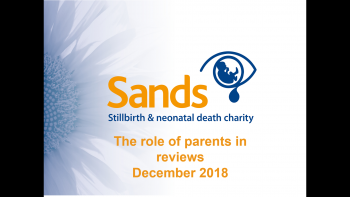Improving how the death of a baby is reviewed by hospitals
Sometimes babies die because of the quality of care mums and babies receive. An enquiry in 2015 (MBRRACE-UK confidential enquiry into babies who died after 37 weeks of pregnancy before birth ‘antepartum term stillbirths’) found that in 60% of cases, the stillbirth might have been prevented if health professionals had followed national or relevant local guidelines. Although professional groups recommend that hospitals review what happened when a baby dies unexpectedly, the confidential enquiry found that only 1 in 10 hospitals carried out a review and many of these were not good quality.
The 2016 Lancet Series: Ending Preventable Stillbirths reported that a high proportion of stillbirths globally and in high-incomes countries like the UK could be avoided. But lessons about what went wrong are often overlooked and opportunities to improve care are missed. Sands has long campaigned for every baby’s death - from 22 weeks’ gestation to 28 days of life – to be reviewed in a thorough way and to include the views of parents, whose view of care, as the people at the centre of it, is unique and vital.
Key standards and data items for review were developed with a group of experts lead by the Sands and Department of Health (DH) Task and Finish Group, between 2012 and 2015. It was as a result of this work that on behalf of the DH, the Health Quality Improvement Partnership (HQIP) commissioned in 2016 a web-based tool to support good-quality hospital reviews.
What Sands does
After six years of championing the need to establish good quality, hospital reviews for when a baby dies, Sands was thrilled when the government funded a new standardised Perinatal Mortality Review Tool or PMRT in 2017. This is free to use and rolled out nationally in 2018. The tool is iterative, meaning it will adapt, improve and change as hospitals use it and feedback to its developers at Oxford University.
Sands is directly involved in the development of the tool which is run by a collaboration, led by Oxford's MBRRACE-UK (Mothers and Babies: Reducing Risk through Audit and Confidential Enquiries across the UK), and including representatives from Sands, the PARENTS study in Bristol and Manchester, the British Association of Perinatal Medicine, the Royal College of Obstetricians and Gynaecologists and the Royal College of Midwives.
Sands aim is to ensure that parents can share their experience of their care, their questions and concerns, as part of the review process, as well as receive honest, open and sensitive feedback about the findings of the review. To see why it's important to offer parents the opportunity to share their views and questions as part of review see Sands presentation. The podcast by Charlotte Bevan, the Sands representative on the MBRRACE-UK/PMRT collaborations, is also available below.
The new national Perinatal Mortality Review Tool (PMRT) is available in England, Scotland and Wales and is free to use. For more information and to see the first annual report on the initial 1,500 reviews undertaken using the PMRT, go to: https://www.npeu.ox.ac.uk/pmrt

